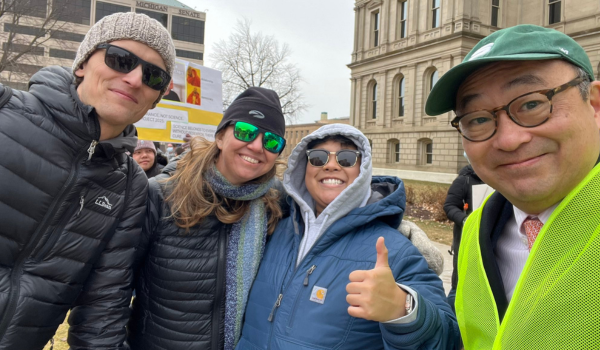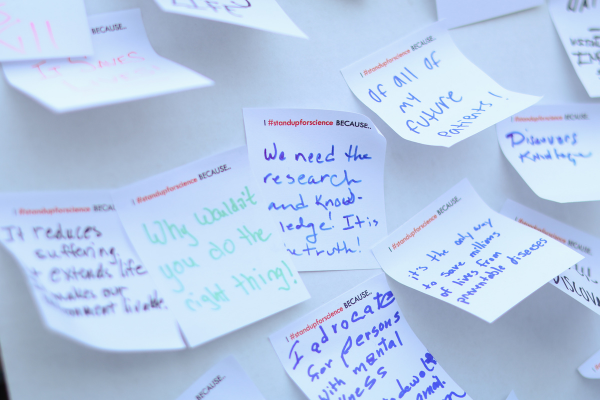
 Without federal support, “people are going to suffer and die unnecessarily,” said Charles Hong, chair of the MSU College of Human Medicine’s Department of Medicine.
Without federal support, “people are going to suffer and die unnecessarily,” said Charles Hong, chair of the MSU College of Human Medicine’s Department of Medicine.
Hong was one of hundreds – scientists, medical students and others – to stand before the Michigan State Capitol and speak out against drastic cuts in federal spending for scientific research at the Lansing rally for Stand Up for Science. It was one of 32 events held in cities all over the country on March 7.
He worries that his three NIH-funded studies of heart failure in newborns, acute respiratory failure in hospitalized patients and brain cancer could be jeopardized.
“American science is the envy of the world,” he said, “and we’re going to throw it away for a pittance? That’s not the American way.”
Planning for the Lansing rally began only a week and a half earlier. By the day of the rally, 500 participants had registered online.
 They attended, carrying signs that said things like:
They attended, carrying signs that said things like:
“Spartans for Science.”
“Trust science, not politics.”
“Research saves lives.”
“Science is for everyone.”
“I’m doing this because my job is to do research to ease human suffering and train the next generation of researchers,” said Jamie Bernard, an associate professor of pharmacology and toxicology at the College of Human Medicine, who helped organize the Lansing event.
 Those at the rally were perplexed, anxious and angry about executive orders and other administrative actions by the National Institutes for Health that would significantly cut or delay funding for medical research.
Those at the rally were perplexed, anxious and angry about executive orders and other administrative actions by the National Institutes for Health that would significantly cut or delay funding for medical research.
“Science has extended the life of every human. That’s true no matter how you voted,” said Stephanie Watts, an MSU professor of pharmacology and toxicology who studies hypertension. “And science is under attack right now. I’ve never seen anything like it.”
Beyond funding for the actual science, attendees also worried that facility and administrative costs – the costs that help with keeping a building’s lights on, while making sure research there is conducted safely – would be cut, negatively impacting what they would be able to do.
In addition to F&A costs, studies that use anything from a list of banned words or phrases are on the chopping block or have been cut, prompting many in attendance to express their discouragement, as well as their commitment to seeing the science through.
 A series of speakers addressed the crowd about the importance of research for treating veterans, curbing climate change, raising healthy children and growing crops to feed the world. Among them was Andi Nations, a second-year MSU College of Human Medicine student.
A series of speakers addressed the crowd about the importance of research for treating veterans, curbing climate change, raising healthy children and growing crops to feed the world. Among them was Andi Nations, a second-year MSU College of Human Medicine student.
“Science has to keep happening. We are not giving up,” Nations said. “We have to protect this research, this education, and these people – so we can all benefit.”

This story was originally published by the College of Human Medicine.
Is your organization interested in collaborating with MSU’s expansive team of dedicated scientific innovators? Click Here.
About the MSU Innovation Center:
The MSU Innovation Center combines research partnerships, technology transfer, and startup support for MSU faculty who aim to see their research applied to make the world a better place.
Composed of Business Connect, MSU Technologies, and Spartan Innovations, the MSU Innovation Center aims to amplify the impact of faculty research and drive economic growth while positively impacting society to solve real-world challenges with cutting-edge ideas.
Through mutually beneficial, long-term partnerships with the private sector, we connect MSU faculty with companies for corporate-sponsored research collaborations. We also play a key role in facilitating the commercialization and public use of technologies and copyrightable materials, moving MSU’s innovations from the lab to the marketplace. Importantly, we provide significant support for faculty entrepreneurs in establishing startup companies based on technologies developed at MSU.
